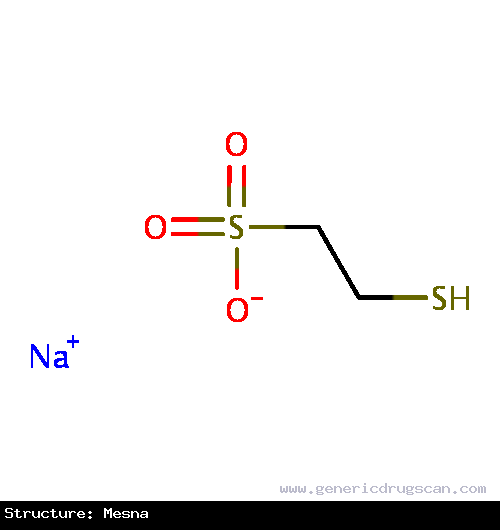Mesna Drug: Indication, Dosage, Precaution, Side Effect , Storage, Category Type and corresponding Brands - www.genericdrugscan.com
Mesna
Drug Status in USA : ApprovedDrug Status in Canada : Approved
pronunciation
pronounced as (mes' na)
Why is this medication prescribed?
Mesna is used to reduce the risk of hemorrhagic cystitis (a condition that causes inflammation of the bladder and can result in serious bleeding) in people who receive ifosfamide (a medication used for the treatment of cancer). Mesna is in a class of medications called cytoprotectants. It works by protecting the bladder against some of the harmful effects of certain chemotherapy medications.
How should this medicine be used?
Mesna comes as a tablet to take by mouth. The first dose of mesna is usually given as an injection into your vein at the same time as you receive your chemotherapy treatment. After that, your doctor may choose to continue your treatment with mesna tablets. It is usually given 2 and 6 hours after your chemotherapy treatment. Take mesna exactly as directed. Do not take more or less of it or take it more often than prescribed by your doctor.
If you vomit less than 2 hours after you take a dose of mesna tablets, call your doctor right away.
Drink at least 1 quart (4 cups; about 1 liter) of liquid daily while you are taking mesna tablets.
Ask your pharmacist or doctor for a copy of the manufacturer's information for the patient.
What are the precautions to be followed?
Before taking mesna,- tell your doctor and pharmacist if you are allergic to mesna, any other medications, or any of the ingredients in mesna tablets. Ask your pharmacist for a list of the ingredients.
- tell your doctor and pharmacist what prescription and nonprescription medications, vitamins, nutritional supplements, and herbal products you are taking or plan to take.
- tell your doctor if you have or have ever had an autoimmune disorder (conditions in which the immune system attacks healthy parts of the body and causes pain, swelling, and damage) such as rheumatoid arthritis, systemic lupus erythematosus, or nephritis (a type of kidney problem).
- tell your doctor if you are pregnant, plan to become pregnant, or are breast-feeding.
What are possible side effects of this medication ?
Mesna may cause side effects. Tell your doctor if any of these symptoms are severe or do not go away:- nausea
- vomiting
- constipation
- loss of appetite or weight
- diarrhea
- abdominal pain
- headache
- tiredness
- dizziness
- hair loss
- loss of strength and energy
- fever
- sore throat
- cough
- flushing
- sensitivity of the skin to touch
- pink or red colored urine
- blood in urine
- swelling of the face, arms, or legs
- hives
- rash
- itching
- difficulty breathing or swallowing
- chest pain
- fast, irregular, or pounding heartbeat
- unusual bleeding or bruising
Mesna may cause other side effects. Call your doctor if you have any unusual problems while taking this medication.
How to store the medication and dispose it of after its use later?
Keep this medication in the container it came in, tightly closed, and out of reach of children. Store it at room temperature and away from excess heat and moisture (not in the bathroom). Throw away any medication that is outdated or no longer needed. Talk to your pharmacist about the proper disposal of your medication.
Drug Category/Class
- Mucolytics
- Cough and Cold Preparations
- Respiratory System
- Detoxifying Agents for Antineoplastic Treatment
- Protective Agents
- Mucolytics
- Detoxifying agents for antineoplastic treatment
| Prescribed | Used therapeutically to reduce the incidence of haemorrhagic cystitis and haematuria when a patient receives ifosfamide or cyclophosphamide for can... |
| Weight : | 164.17 |
| Structure | Mesna |
 | |
| Formula | C2H5NaO3S2 |
Mesna has 8 Brands listed
| Mesna (200 mg) | Mesna (200 mg) (Cipla) |
| Mesna (200 mg) (Cytomed) | Mesna Inj (200 mg) |
| Mistabron (300 mg) | Uromes (100 mg) |
| Uromitexan (200 mg) | Urosna (100 mg) |
Search Generic Drugs alphabetically
